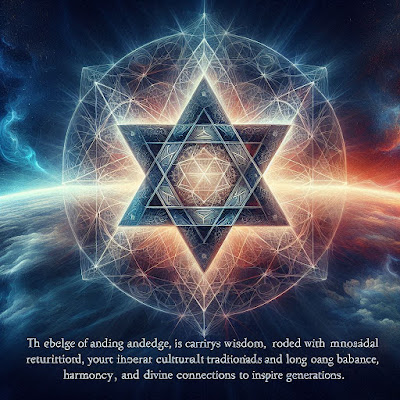The Three Pillars of Transformation: Neuroscience, Metaphysics, and Literature
Introduction
Transformation isn't just about acquiring knowledge—it's about applying that knowledge in a way that brings real, lasting change to your life. To make this happen, we need to understand and engage with three core areas that form the foundation of personal growth: Neuroscience, Metaphysics, and Literature.
These areas aren't isolated; they are deeply interconnected and each plays a critical role in reshaping how we think, feel, and live. Together, they provide a holistic approach to transformation, aligning the mind, body, and spirit to create lasting change.
By exploring each of these pillars, we can unlock deeper layers of self-awareness and empower ourselves to evolve on multiple levels.
Section 1: Neuroscience – Rewiring the Brain for Change
What is Neuroscience?
Neuroscience is the scientific study of the brain and the nervous system, exploring how our brain functions, processes information, and controls our behavior. It’s the foundation of understanding how our thoughts, emotions, and actions are shaped and influenced by the structure and wiring of our brain.
How Neuroscience Relates to Transformation
Neuroplasticity refers to the brain's remarkable ability to reorganize itself by forming new neural connections. This means that the brain isn't static—it's capable of rewiring itself in response to our experiences, thoughts, and actions.
When it comes to transformation, neuroplasticity offers hope for change. By consciously working to change our thought patterns and behaviors, we can create new neural pathways that foster a positive mindset and healthier habits.
Negative thought patterns, self-limiting beliefs, and unproductive habits can all be reprogrammed. Through mindful practice and the intentional formation of new habits, we can actively reshape our brain’s structure and functionality.
Practical Application:
- Journaling: Writing down your thoughts can help you reflect on and reshape negative patterns.
- Meditation: Regular meditation calms the mind and enhances neural connections that support emotional balance.
- Cognitive Behavioral Techniques (CBT): CBT helps identify and challenge negative thought patterns, reprogramming them into healthier alternatives.
These practices, over time, help to "rewire" the brain, promoting positive and lasting transformation.
Section 2: Metaphysics – Exploring the Energy of Change
What is Metaphysics?
Metaphysics is the branch of philosophy that explores the fundamental nature of reality, existence, and consciousness. It asks big questions about what the universe is made of, what is the nature of energy, and how consciousness shapes our reality.
How Metaphysics Relates to Transformation
- Everything in the universe is energy, and this energy is constantly in motion. Personal transformation is deeply connected to how we interact with the energies around us—and within us.
- The concepts of vibrational frequency, mind-body connection, and the law of attraction offer insights into how our thoughts and intentions shape the reality we experience.
- When we raise our vibrational frequency (through positive thinking, intention-setting, and mindfulness), we align ourselves with the energies of change, healing, and growth.
Practical Application:
- Visualization: Imagine yourself already transformed. Visualizing your goals and dreams as if they've already happened can have a profound impact on aligning your energy with your desires.
- Affirmations: Speak positive statements about yourself and your transformation. Affirmations shift your mindset and reprogram your subconscious.
- Energy Healing: Practices like Reiki or sound healing can balance and shift energetic blockages in the body, helping you feel more aligned with your true potential.
- Sacred Geometry: Working with symbols like sacred geometry can help harness cosmic energy and guide personal transformation.
These metaphysical tools help you connect with the deeper, energetic dimensions of life, making it easier to align your inner state with the changes you want to see in the world around you.
Section 3: Literature – Harnessing the Power of Storytelling for Growth
What is Literature?
Literature is the art of storytelling—stories that allow us to explore human experiences, emotions, and dilemmas. Books have the power to take us to new worlds, help us step into different lives, and reflect on our own.
How Literature Relates to Transformation
- Stories allow us to explore and develop emotional intelligence by immersing ourselves in the experiences of others. Whether it's empathy, understanding complex emotions, or learning to navigate conflict, literature teaches us invaluable life lessons.
- Narrative therapy is a powerful concept where we engage with the stories of others to reflect on and reframe our own. The act of reading and reflecting on stories helps us process our own experiences and reshape our personal narratives.
- Stories activate the brain, boosting creativity, emotional processing, and mental well-being. They are tools for cognitive and emotional development that allow us to engage with the world from a broader, more informed perspective.
Practical Application:
- Book Recommendations: Look for books that promote growth—whether through personal development, exploring new philosophies, or providing fresh perspectives.
- Reflective Journaling: After reading, ask yourself: What did I learn from this story? How does it relate to my life?
- Regular Reading: Make reading a part of your daily or weekly routine. The more you engage with literature, the more you expand your emotional and intellectual horizons.
Conclusion
Each of these three areas—Neuroscience, Metaphysics, and Literature—offers a unique path to transformation. By understanding and actively engaging with all three, we can begin to change not only our minds and bodies, but also our realities. They work together, creating a synergistic process that guides us toward deeper self-awareness and lasting growth.
Reflective Question:
Which area do you feel most drawn to explore first in your transformation journey? Neuroscience, Metaphysics, or Literature?




Comments
Post a Comment